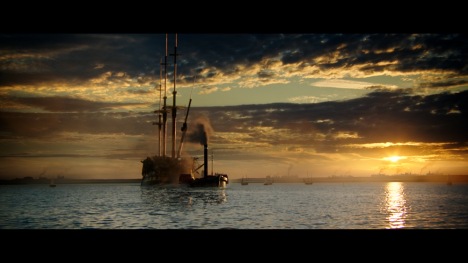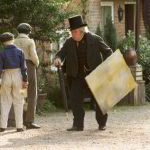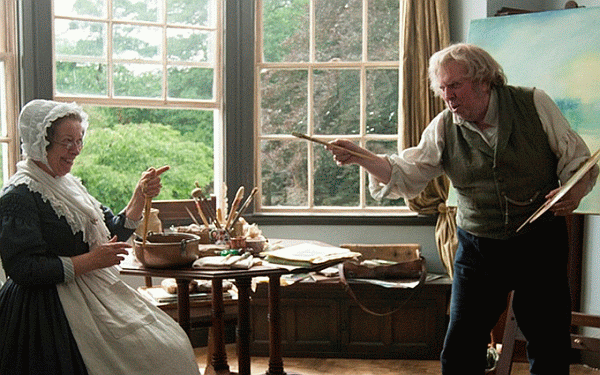Mr Turner is another foray by esteemed director Mike Leigh into the genre of historical biopics, following in the footsteps of the excellent Topsy Turvy. Mr Turner shares some characteristics with its stable mate, notably the cinematic idioms associated with Leigh’s distinctively honed but equally quirky movies. As with many of Leigh’s works, it is heavily populated by his own repertory company, led in this instance by the unexpectedly versatile Timothy Spall in their seventh collaboration.
Leigh is loved by some and equally loathed by others. The film has been lauded by many but is most certainly not to all tastes. It was entered for the Palme d’Or at the Cannes Film Festival, where Spall won the prize for Best Actor, and another regular collaborator, Dick Pope, for Cinematography, though it did not win enough friends on the jury to win Best Film.
However, virtue can be its own reward and in Leigh’s case his prime virtue is minute attention to detail in every aspect of his productions. Every scene in Mr Turner is meticulously crafted, nothing left to chance in the search for authenticity, certainly not the superficial gloss of period pieces from Hollywood.
And with due respect to Mr Pope, every scene looks absolutely ravishing, lit naturalistically but highlighting a palate of glorious colours, perhaps slightly muted but designed to glorify the expressive golds and greys in Turner’s pictures, none more so than the glorious shot recreating the poignant moment where the Fighting Temeraire is towed into Rotherhithe to be broken up for scrap. It became Turner’s most famous work, but on film the moment is simply perfect – more poetically beautiful than it has any right to be.
Spall has been rightly lauded for his performance, and is always watchable and entertaining, but he plays the artist as a distant, opaque figure, based no doubt on contemporary accounts of Turner’s chubby countenance, brusque manners and eccentrically antisocial behaviours. It is well documented that Leigh allowed nobody on set who could not paint, so Spall spent two years learning to paint for the role. A number of original Spalls, in the manner of Turner, are displayed in the film, and the movie comes alive in those rare moments when Turner’s rapid-fire technique with colours and savage brush strokes is portrayed.
Indeed (Turner’s most commonly used term) this is how Turner does his talking, since he is generally a man of few words but many grunts and growls, laced with plenty of awkward silences. It’s not that he is incapable of displaying emotion, notably on the death of his beloved father and later on declaring love for his second mistress, Mrs Booth.
For the most part Turner is portrayed as socially inept, introspective, lacking in the emotional wherewithal to express himself beyond tart small talk. Maybe he was somewhere on the autistic spectrum, but there is no doubt the artist was not easily accessible, nor especially likeable unless you took a lot of time and trouble to get to know the inner man.
Whether Leigh’s camera gets under the skin is debatable, but I did not come away feeling like the true motives of Turner had been fully revealed, let alone the source of his genius, nor yet the inspiration for his paintings, as they morph from conventional landscapes of the time into dreamlike seascapes.
The film meanders at a gentle pace through aspects of the artist’s life – the introspective sketching, the savage painting, the perfunctory humility shown to benefactors, the passive cruelty shown to his loyal housekeeper and to his erstwhile mistress and daughters, the uneasy relations with fellow members of the Royal Academy and the relative peace and relaxation found in trips to Margate.
The camera lingers on every scene like an observant but sceptical onlooker; in many such scenes it lingers with relish perhaps longer than comfortable, as if waiting for and even daring something dramatic to happen. If an outpouring of passion and emotion was expected, such moments are few in two-and-a-half-hours of screen time. Topsy Turvy is also a long film, but reaches a crescendo as the Mikado takes to the stage and proves a great hit. In Mr Turner there is no dramatic climax, only small and subtly explored moments of piquancy and irony. Both films make extensive use of music, surprisingly so in the case of Mr T.
That said, Leigh has done an admirable job in coaxing from his players unspoken magic. Dorothy Atkinson‘s Hannah Darby, housekeeper to Turner for 40 years but barely acknowledged, used for sex when it suited him but never given the crumb of a fond affection that she craves. Her face truly says it all, living as she does in hope. Eventually she remarks that she might as well not bother changing the sheets and finds to her distress that Turner is spending most of his time living at an address in Chelsea with Mrs Booth. Her face speaks volumes: at first frustrated, later mournful, eventually the countenance of a tragic heroine, utterly bereft.
Nor is Atkinson unique in this respect; with the exception of Mr Ruskin and a few more, Turner’s contemporaries seem muted in their eloquence and communicate extensively and most precisely through body language and the studied subconscious facial expressions only made possible through fine acting and direction. Small wonder many of the cast also appeared in Topsy Turvy.
As you can tell from these words, there is very much to admire about Mr Turner – the meticulous attention to detail, the thoughtful acting, the historical accuracy, the divine photography, costumes, and much more. If Pope does not win the Oscar I will eat my proverbial hat, though he may well not be alone – production design and costumes will not be far behind. Maybe Spall and other actors will get a mention in despatches, maybe even a nomination for Leigh, but this should not distract from the inevitable truth that Mr Turner is not the complete package.
To some extent I wish it had devoted more screen time to the creative process of the art and the motivation of the artist, but most of all I wish the movie was more emotionally engaging. Sad to say that while it is never boring, it never draws its audience in and leaves them wanting more. Perhaps more judicious editing might have helped, but where Topsy Turvy is much more than the sum of its parts, Mr Turner contrives to be slightly underwhelming by virtue of being all dressed up with no place to go – it creates Turner’s life but forgets his purpose, his drive, his raison d’être.
Maybe I should see it again, all the better to appreciate the nuances I missed first time, but it was a late night on a Tuesday and a long film. Not impossible my eyes closed for a few seconds here and there along the way!

















